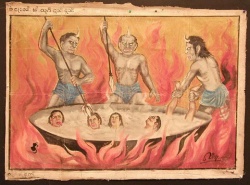Tanhā
(lit. 'thirst'): 'craving', is the chief root of suffering, and of the ever-continuing cycle of rebirths. "What, o monks, is the origin of suffering? It is that craving which gives rise to ever-fresh rebirth and, bound up with pleasure and lust, now here, now there, finds ever fresh delight. It is the
- sensual craving (kāma-tanhā ),
- the craving for existence (bhava-tanhā ),
- the craving for non-existence (vibhava-tanhā ) (D.22).
T. is the 8th link in the formula of the dependent origination (paticcasamuppāda). Cf. sacca.
Corresponding to the 6 sense-objects, there are 6 kinds of craving craving for visible objects, for sounds, odours, tastes, bodily impressions, mental impressions (rūpa-, sadda-, gandha-, rasa-, photthabba-, dhamma-tanhā). (M.9; D.15)
Corresponding to the 3-fold existence, there are 3 kinds: craving for sensual existence (kāma-tanhā), for fine-material existence (rūpa-tanhā), for immaterial existence (arūpa-tanhā ). (D.33)
There are 18 'thought-channels of craving' (tanhā-vicarita ) induced internally, and 18 induced externally; and as occurring in past, present and future, they total 108; see A. IV, 199; Vibh., Ch. 17 (Khuddakavatthu-Vibhanga ).
According to the dependent origination, craving is conditioned by feeling; on this see D. 22 (section on the 2nd Truth).
Of craving for existence (bhava-tanhā ) it is said (A.X.62): "No first beginning of the craving for existence can be perceived, o monks, before which it was not and after which it came to be. But it can he perceived that craving for existence has its specific condition. I say, o monks, that also craving for existence has its condition that feeds it (sāharam) and is not without it. And what is it? 'Ignorance', one has to reply." - Craving for existence and ignorance are called "the outstanding causes that lead to happy and unhappy destinies (courses of existence)" (s. Vis.M. XVII, 36-42).
The most frequent synonyms of tanhā are rāga and lobha (s. mūla).
